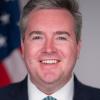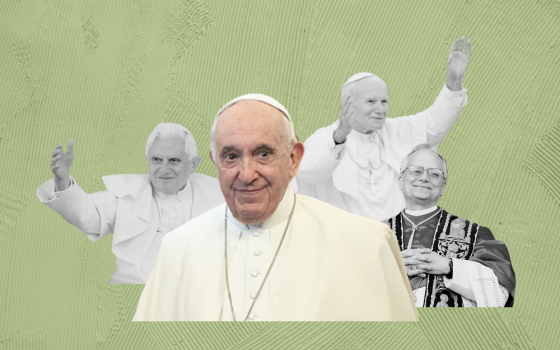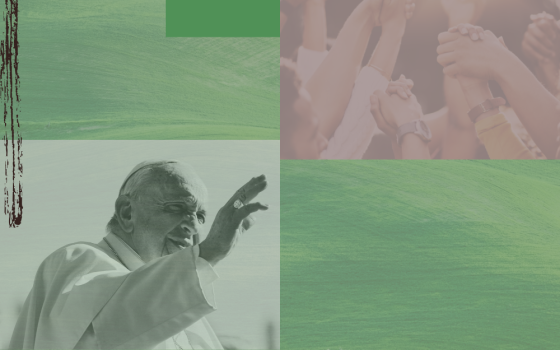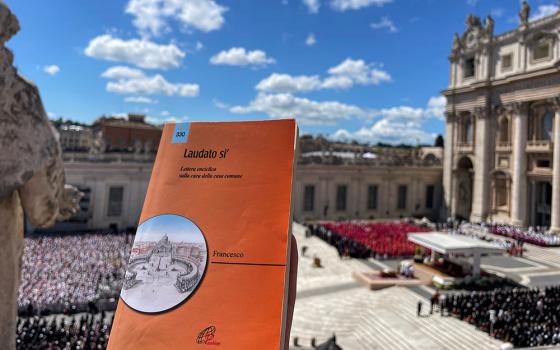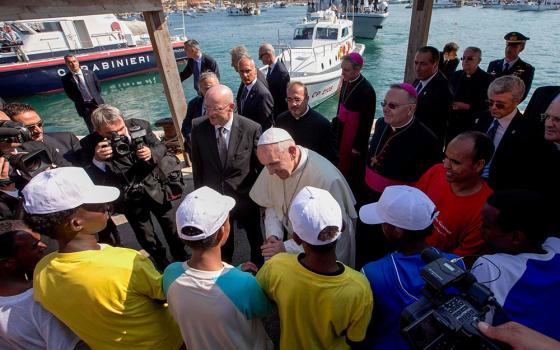
Pope Francis walks down the aisle with then-U.S. Speaker of the House John Boehner and then-Vice President Joe Biden after delivering an address to a joint session of Congress at the U.S. Capitol in Washington Sept. 24, 2015. Biden attended the April 26, 2025, funeral of Francis, who died April 21 at age 88.(OSV News/Michael Reynolds, pool via Reuters)
I've worked with elected officials and candidates as they seek to engage the Catholic Church and community — and have seen up close how the papacy of Pope Francis can better inform our public life today.
In a deeply polarized world, Francis was one of the few leaders who seemed to be able to transcend ideological lines and receive the admiration of politicians from all partisan ideologies. You would certainly be hard-pressed to find another person who both President Donald Trump and former President Joe Biden can come together and praise.
As distrust continues to rise among leaders and the communities they serve, officials would be well served to follow the example of Pope Francis.
Humility
As Pope Francis was announced to the world from the balcony of St. Peter's Basilica, he could have easily used that moment to talk about himself and his pontificate. Instead, he spoke of themes of "mutual trust" and invited the crowd to "pray for one another." Then, in a moment of humility, he asked those gathered to pray for him, and that the Lord would bless him.
Those gathered and those watching could not help but be moved at the gesture of the leader of the Church asking them to pray for him — not the other way around.
This became a signature refrain of his pontificate, often asking the powerful and the powerless to offer their prayers for him, demonstrating that even the vicar of Christ is in need of support and redemption.

Contributor John McCarthy is pictured with Pope Francis. (Courtesy of John McCarthy/Vatican News)
Always be open to dialogue
We are currently in a climate where too many of us retreat to our own corners. Yet on Easter morning, after weeks in the hospital, Pope Francis met with Vice President JD Vance — whom he had recently publicly disagreed with on migration. This visit not only presented the pope an opportunity to reaffirm the church's teachings, but also to show that we are always meant to treat others with respect and be in dialogue with one another.
When Pope Francis famously said, "Who am I to judge?" he gave us all permission to put our egos and hard-nosed opinions aside, to instead find ways to listen.
We will never find commonalities if we write each other off.
Pope Francis meets briefly with U.S. Vice President JD Vance, and his translator, in the papal residence, the Domus Sanctae Marthae, at the Vatican April 20, 2025. The Vatican said the meeting was an opportunity to exchange best wishes for Easter. (CNS /Vatican Media)
Be among the people you serve
Pope Francis has talked about the church being a "field hospital"— directly engaged with the people it is meant to serve. His actions have embodied this idea throughout his papacy.
His first trip to Lampedusa, an island in southern Italy known as a port for poor migrants, demonstrated that he would be a pope who embraced the peripheries and used his platform to shine a light on the unseen.

Pope Francis, in the popemobile, greets people in St. Peter's Square at the Vatican after giving his Easter blessing April 20, 2025. Francis died April 21 at age 88. (CNS/Pablo Esparza)
On his final Easter Sunday, the pope not only appeared at St. Peter's and gave his urbi et orbi ("to the city and the world") address, but he chose to move among those gathered and greet people directly. Moving about the crowds could not have been easy for the pope who had spent weeks in the hospital — but he knew that his presence would be an important signal in that moment.
Always speak truth to power — with thoughtfulness
Pope Francis never shied away from using his stature to share what he believed and the teachings of the church. But unlike the tone of politics today, he never did this in a way that was meant to embarrass others. He always wanted to bring others along in the process.
During his visit to the United States in 2015, he spoke of his mission being "to offer words of encouragement to those called to guide the nation's political future in fidelity to its founding principles." He could have simply listed his policy priorities and tried to draw contrast with those who disagreed. Instead, he framed his remarks as encouraging a gridlocked political system to remember its purpose: service to others.
Advertisement
The purpose of politics
In his address to Congress, Francis reminded us, "Politics is … an expression of our compelling need to live as one, in order to build as one the greatest common good."
This sense of common purpose is the thing most missing from public life today.
Our country must reinvigorate our shared identity and purpose. To do that, we can look to the life of Pope Francis. Our society and our humanity will be at its best when we follow his simple refrain and open ourselves up to "todos, todos, todos" — "everyone, everyone, everyone."
